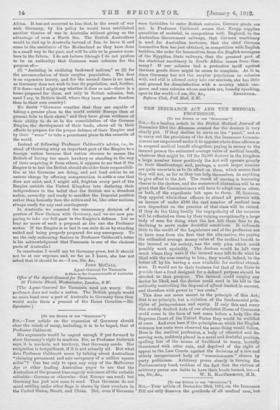THE INSURANCE ACT AND THE MEDICAL . PROFESSION.
[To TIM EDITOR Or TUE "SPECTATOR:1 a leading article in the British Medical Journal of December 23rd the dilemma created for the doctors is very clearly put. If they decline to serve on the " panel," and so to carry out the provisions of the Act, the Insurance Commis- sioners are empowered under it to appoint whole-time officers or to suspend medical benefit altogether, paying in money to the insured person the estimated average value of medical benefit, whatever that might he. Of the 30,000 doctors in the kingdom a large number know positively the Act will operate greatly to their disadvantage, and, perhaps, a much larger number are quite uncertain as to its effect on them, which means that they will not, as far as they can help themselves, do anything to give effect to the Act. The result of serving is becoming clearer to the doctors, and the measure of abstention will be so great that the Commissioners will have to adopt one or other, or both, of the expedients left open to them. If, however, they appoint whole-time officers to attend all persons with an income of under £160 the vast number of medical men now dependent on the practice of that class will be ruined. If they do the thing locally the unpopularity of the measure will be reflected on them by their ruining exceptionally a large body of men for doing what the law left them free to do, declining to serve under doubtful conditions. It redounds little to the credit of the Legislature and of the profession not to have seen from the first that the alternative, the paying the estimated average money value of the medical benefit to the insured or his society, was the only plan which could possibly work equitably. The doctors would be left very much where they were if the insured were left to do what he liked with the sum coming to him ; they would, indeed, be the better off by his having a sum available for medical attend- ance. It would not be their business but that of the State to provide that a fund designed for a defined purpose should be devoted to that purpose. The insured could employ any doctor he liked, and the doctor could send in his bill to the authority controlling the disposal of a:fund limited in amount, and therefore with power to " tax costs."
This does not mean assent to the principle of this Act ; that is no principle, but a violation of the fundamental prin- ciples of jurisprudence and equity. If only this and many like crudely drafted Acts of our absolutist House of Commons could come in the form of test cases before a body like the Supreme Court of the United States they would be nullified at once. And even here if the principles on which the English common law rests were observed the same thing would follow, Here is the medical profession, a body of educated and de. serving men, suddenly placed in a novel and doubtful, position, spelling loss of the means of livelihood to many, brutally threatened with utter ruin, and deprived of the right of appeal to the Law Courts against the decisions of a raw and utterly inexperienced body of "commissioners ". chosen by party politicians. Arbitrary power clearly is turning the Parliamentary head, reckless of the fact that the victims of arbitrary power are liable to have their heads turned, too.—I


















































 Previous page
Previous page